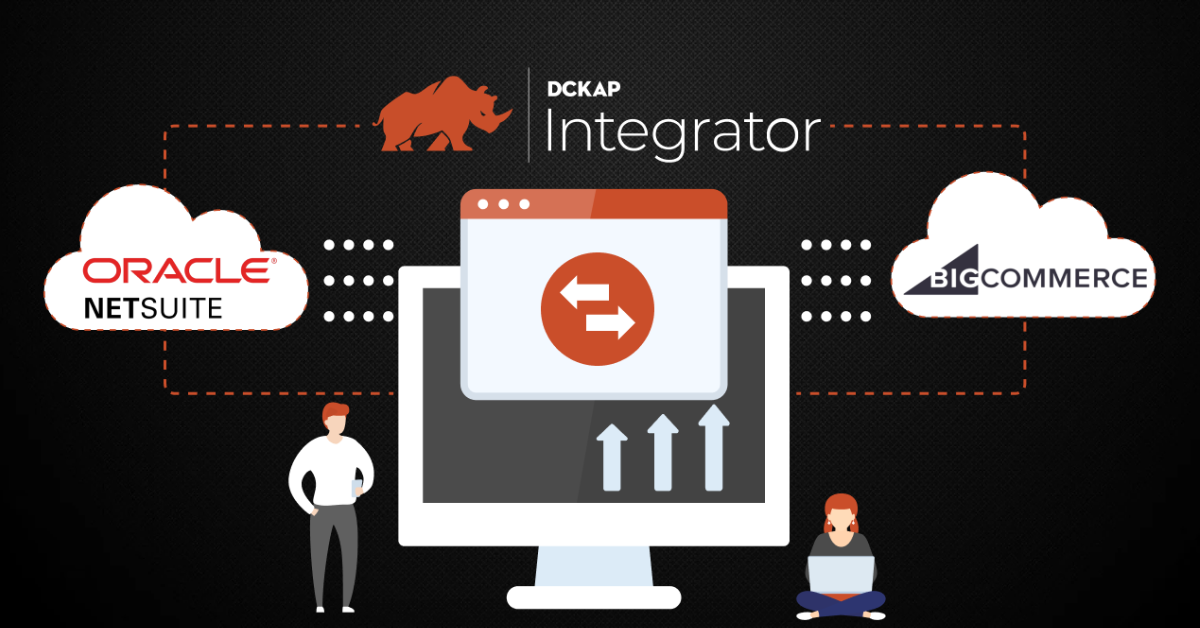If you haven’t yet, it’s definitely time to get started with eliminating manual data entry and streamlining your entire supply chain management process through bi-directional data transfer.
BigCommerce NetSuite integration is the perfect solution to control your sheer volume of data and build accurate inventory levels. Connecting your BigCommerce and NetSuite accounts allows you to streamline your business process, reduce manual errors, and gain real-time visibility into your sales and inventory data.
BigCommerce NetSuite Integration Methods
Point-To-Point Integration
Point-to-point solutions are simpler and hence less expensive, but they are also more basic. Your systems are inextricably linked, which can make it tough to add, alter, or delete systems as your company grows. In the worst-case scenario, each system update may necessitate re-integration to ensure that your solution runs properly.
Other factors to consider are the data kinds that can be synchronized, the frequency with which they will be synced, and the amount of data that can be managed.
Custom Solution
If your company has particularly unique needs, you might want to find bespoke BigCommerce & NetSuite integration solution providers who have a decade of experience. This is more frequent with direct integrations, but you must have faith in your integration partner’s talents and be OK with the fact that you will be working together for the duration of your solution. You must also be certain from the start that you have a thorough knowledge of your present and future needs with a BigCommerce NetSuite integration.
iPaaS Middleware
With middleware, data will be synchronized and translated between your systems. Connectors may be removed or added without having to rebuild your integration, making it easier to add and remove systems. While the middleware approach may be difficult to zero on, it has greater potential to grow with your company. You’ll be able to deal with more data and more complicated business procedures. For a solution that is more scalable and weighs less on your expenses, iPaaS or middleware would be a great solution.
Recommended read: 10 NetSuite Integrations + Top Methods For Distributors 2024
Use Cases For BigCommerce NetSuite integration
BigCommerce and NetSuite is a powerful partnership. With this integration, distributors will be able to automate and simplify the most critical business operations – such as financial, inventory, and order management.
1. Automated Financial Management
Integrating BigCommerce with NetSuite will automate billing, invoicing, and revenue recognition. This integration will reduce manual entry, lowering the possibility of errors while keeping financial data accurate and timely.
2. Streamlined Inventory Management
The integration also enables real-time updates from inventory across different channels and locations. It helps maintain ideal inventory levels while reducing the possibility of overstock or stockout scenarios. It also contributes to the efficiency of order fulfillment.
3. Unified Order Management
Orders from BigCommerce and other channels can be managed in NetSuite to deliver a single view of order processing, fulfillment processes, and returns. It enhances customer service via quicker and more accurate order handling.
4. Operational Efficiency
Automating and consolidating key operations delivers profound increases in efficiency, freeing up more time and resources to be spent on strategic initiatives rather than on repetitive to-dos.
Overall Scalability
The integration is designed to scale with a growing business, offering the ability to increase products and sales in new geographies and manage new order volume while still servicing customers in a timely manner.
How Integrating BigCommerce With NetSuite Helps
When you integrate your online store & ERP (enterprise resource planning software), it can result in increased operational efficiency and customer satisfaction. You may obtain a competitive edge by meeting, surpassing, and anticipating your consumers’ expectations by boosting efficiency and automating operations.
In the case of BigCommerce & NetSuite Integration:
- It is the perfect way to keep your listings consistent across all of your different ecommerce marketplaces.
- It eliminates the hassle of entering sales data and sales orders into multiple systems, ensuring that all of your product information and inventory levels are always up-to-date.
- Moreover, by integrating BigCommerce and NetSuite, you can also easily manage customers, financials, inventory, shipping, and more from one single platform.
However, your integration project must be meticulously planned and properly managed. You need to compare different integration apps to streamline comprehensive flows and sync inventory levels.
Best Practices of BigCommerce NetSuite integration
Here are some of the best practices you must consider before the integration process:
Experience backing the solution
Your preferred merchants should be able to exhibit extensive BigCommerce and NetSuite integration experience. They’ll need to know how each system deals with data. Examine your potential integration providers for proof that they have integrated these solutions and how their clients have benefited before deciding on a BigCommerce NetSuite integration.
Data Types & Synchronization
Understanding the sorts of data that may be exchanged and synced is critical to avoid disappointment. Some systems, for example, may not automate or synchronize all sorts of data and instead focus on orders and inventories. You could discover that your solution doesn’t enable tracking data for customers, products, or shipments.
Every business activity, from inventory management to order management & financial management to catalog management to billing, can be automated and shared in real time between Oracle NetSuite and BigCommerce. Determining the data you want to sync will help ensure better results with the integration.
Accuracy
In every company, there will always be missing vital information. It could be a data entry mistake, for instance, where the price of an order entered in your BigCommerce store is different from the pricing in NetSuite, or the stock-keeping unit (SKU) doesn’t exist in NetSuite. With built-in rules and procedures to verify and rectify these sorts of problems, your integration solution should be able to manage these exceptions.
Maintenance
It’ll be just as vital to look after your integration solution as it would be to look after your BigCommerce and NetSuite systems. It’s important to keep track of ongoing support, security updates, and product improvements. It’s crucial to figure out who will be in charge, how upgrades will be handled, and what this means for your company.
Maintenance occurs automatically and is part of your membership for Cloud-based systems, such as BigCommerce and NetSuite, so you’ll want to make sure your integration will stay up, preferably in the Cloud as well.
Support
You must have faith in the assistance given by your integration partner. After your integration project is completed, you should negotiate the amount of service you will receive. Check whether they monitor data flows, for example, to ensure that transactions are running smoothly through your system.
Related read: Top 5 BigCommerce Integrations and Use Cases (2024)
Sync Your BigCommerce Store and NetSuite with DCKAP Integrator
DCKAP Integrator is the most powerful solution for distributors looking to streamline their processes and increase their efficiency.
The integration of BigCommerce and NetSuite allows a seamless connection between the two systems sharing real-time insights.
This can help you reduce manual errors, gain real-time visibility into your sales and inventory data, and take advantage of powerful integrations that can save you time and money while making informed decisions for your business.
Here is why you may consider DCKAP Integrator for NetSuite BigCommerce Integration.
- Extensive experience in working with BigCommerce and NetSuite
- User-friendly and Intuitive Interface
- Advanced Mappers and Modifiers
- Pre-built Connectors
- customization options
- Automated alerts to notify errors
- Efficient team of experts for support
And much more.
DCKAP Integrator offers transparent pricing structures. It is an ideal choice for businesses of all sizes, even the ones with budget constraints. So don’t wait – get started today to start boosting your business efficiency with BigCommerce NetSuite Integration!
Get in touch with us to know how DCKAP Integrator, built for manufacturers and distributors, can help you simplify your data flow.
FAQs
Why choose to integrate BigCommerce and NetSuite?
The actual benefits of combining two strong technologies like BigCommerce, leading e-commerce platform, and Oracle NetSuite ERP, a cloud-based enterprise resource planning system are the increased operational efficiency and data management accuracy that can be obtained by working with a single source of trustworthy data.
Several of the major advantages of integration include:
- Accurate data and accurate order records
- Focus on bi-directional data exchange
- Real-time data synchronization
- Smoother workflows
- Improved organizational transparency
- More accurate SWOT analysis
- Reduced manual effort and human errors
How does integration bring better customer experiences to life?
Improve customer experience with accurate and real-time inventory information, order processing at a faster speed, and financial transaction in a seamless manner. This indeed reduces the delivery time, errors, and makes shopping more reliable.
Will the integration support my business as it grows?
Yes, the BigCommerce NetSuite integration scales with your business. It manages volume surges, new lines of products, and an expansion into new markets, while keeping the performance and satisfaction of customers high.
Why should I choose DCKAP Integrator over custom integration?
DCKAP Integrator is an integration platform with pre-built connectors via APIs. As a result, businesses will be able to reduce the organization’s monthly spending and the overall timeline to have an automated solution in place. It’s a cloud-based solution, so end users don’t have to handle hosting. In addition, we offer a wide range of support throughout a majority ERP solutions, eCommerce platforms, CRMs, and even if you switch applications in the future, DCKAP will take care of your integration upgrades so you can focus on the business.
Why should I integrate my eCommerce platform with an ERP system?
Some of the benefits that arise from integrating your eCommerce platform with an ERP system include:
- Data accuracy: Lacks manual input of data, meaning no errors.
- Improved customer experiences: Customers can access real-time information on inventory and orders.
- Operational efficiency: Automates key business functions.
- Better decision-making: Provides comprehensive insights into the business.
What steps are involved in the ERP and eCommerce integration process?
The general process of integrating ERP and eCommerce consists of the following steps:
Assessment: Evaluate the needs and goals of the integration.
- Plan: Create a detailed integration plan, with timelines and the required resources.
- Configuration: Set up and configure both systems for integration.
- Data Migration: Transfer existing data to the new integrated system.
- Testing: Perform comprehensive testing to ensure smooth functionality.
- Training: Train the users to acquaint them with the new integrated system.
- Go-live: Launch the integrated system and monitor its performance.
- Optimization: Keep optimizing upon the feedback and learnings from the users and the performance.
Contents




